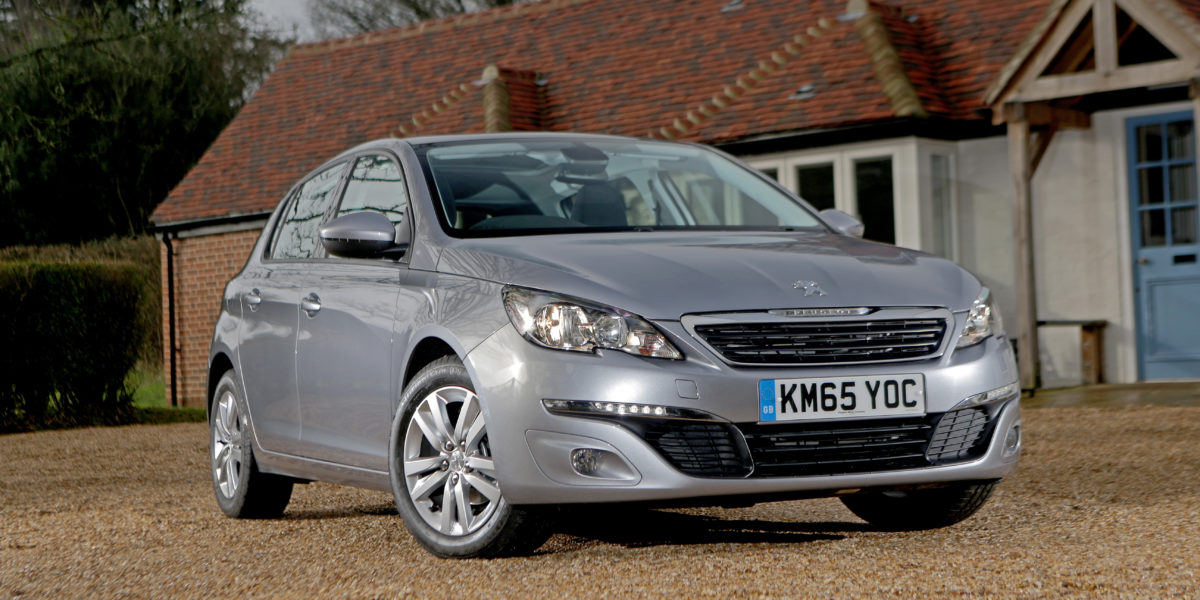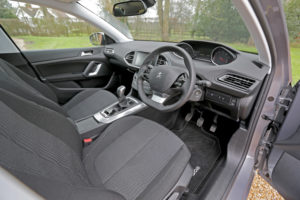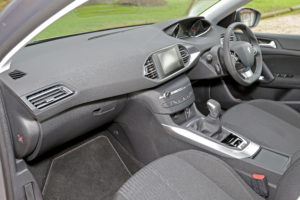
The specs
| Model tested: | Peugeot 308 Active BlueHDi |
|---|---|
| Price: | £18,845 |
| Engine: | 1560cc |
| Power: | 99bhp@3750rpm |
| Transmission: | 5-speed manual |
| 0-62mph: | 9.7 seconds |
| Top speed: | 116mph |
| Economy / CO2: | 78.5mpg/94g/km |
| Insurance: | 16 |
Review: Peugeot 308 (Overall score = 4/5)
When the second-generation Peugeot 308 was crowned Car of the Year on its arrival in 2014, it was clear that the French car maker had made great strides in terms of efficiency, safety, quality, design and dynamics. While some of the French company’s previous products were rather fragile, the 308 raised the bar higher than ever, although it still comes with only a three-year warranty when some rivals offer up to five years – or in the case of Kia, seven.

Cabin (4/5)
If you haven’t sat in a Peugeot for a while you’ll be amazed at just how far its cabins have come in a short space of time. Everything you can see and touch is of a high quality with excellent fit and finish. Everywhere you look there are brushed alloy highlights and neat little design flourishes that raise the perceived quality and make the ownership experience that bit better. However, Peugeot has maybe simplified the dash design a little too much, as to adjust anything you have to go into the touch-screen display.
So tweaking the climate control, adjusting the audio or setting the navigation means navigating menus, some of which aren’t very intuitive. Cabin space is good; there’s ample rear-seat leg and head room as long as the front seats aren’t all the way back. Despite the spacious cabin there’s no shortage of boot space; 470 litres with the seats up or 1309 litres with them folded.

Driving (4/5)
The most obvious thing about the 308’s interior is how small the thick-rimmed multi-function steering wheel is and how low it’s set. In theory you look over it to see the instruments but some drivers will find the rim obscures key information. The instrumentation is also rather busy; the dials are clear but there’s potentially a lot of supplementary information displayed between them which might lead to confusion. The steering wheel adjusts for reach and rake and there’s plenty of seating adjustment too, so getting comfy shouldn’t be a problem. Our test 308 came with diesel power, although the superb 1.2-litre turbocharged three-cylinder petrol unit is also worth a closer look as it’s so frugal and willing. The diesel is so quiet and has such a linear power delivery that it would be easy to assume it’s a petrol unit; only the lower redline gives the game away. However, the five-speed gearbox really needs an extra ratio as those fitted are a bit too widely spaced for low-speed driving. The gearshift itself is sweet enough and the rest of the controls are nicely weighted, but what’s really impressive is the tight turning circle; the 308 is more agile than many of its rivals. Sadly the 308 isn’t as smooth riding as you might hope though; Peugeots of old were renowned for their cossetting ride, but as with many modern cars, some comfort has been sacrificed for handling prowess. The 308 comes with an optional electronic parking brake, and while these can be clunky the 308’s is very slick; as soon as you take up the drive the brake releases for a smooth getaway every time. And to make your pupils’ lives easier, hill hold assist is standard.

Costs (4/5)
There are six trim levels (plus GTi), which run Access, Sportium, Active, Allure, GT line, GT. You’ve got a choice of two petrol engines (1.2, 1.6) or a pair of diesels (1.6, 2.0). The cheapest 308 is an 82bhp 1.2 Access at £14,995. While these entry-level cars feature air-con, bluetooth and powered front windows we’d go for at least an Active (£17,145 for a 110bhp 1.2), as this brings dual-zone climate control, a large multi-function touch-screen, automatic lights and wipers plus alloy wheels and rear parking sensors.
With some of the most efficient petrol and diesel engines on the market (the 1.6 diesel is rated at 82-94g/km, the 1.2 petrol at 95-114g/km), fuel and road tax costs should be on the floor while insurance ratings are generally low too. The big unknown is depreciation, as this generally hasn’t been a strong suit for Peugeot in the past. Having made huge advances in desirability in recent years, the 308 may yet hold its value rather better than its predecessors; it certainly deserves to.
Check out this video from our friends at Evans Halshaw
If you’d like to lease a Peugeot 308 as your next car then you can enquire about this vehicle with Dualdrive.


